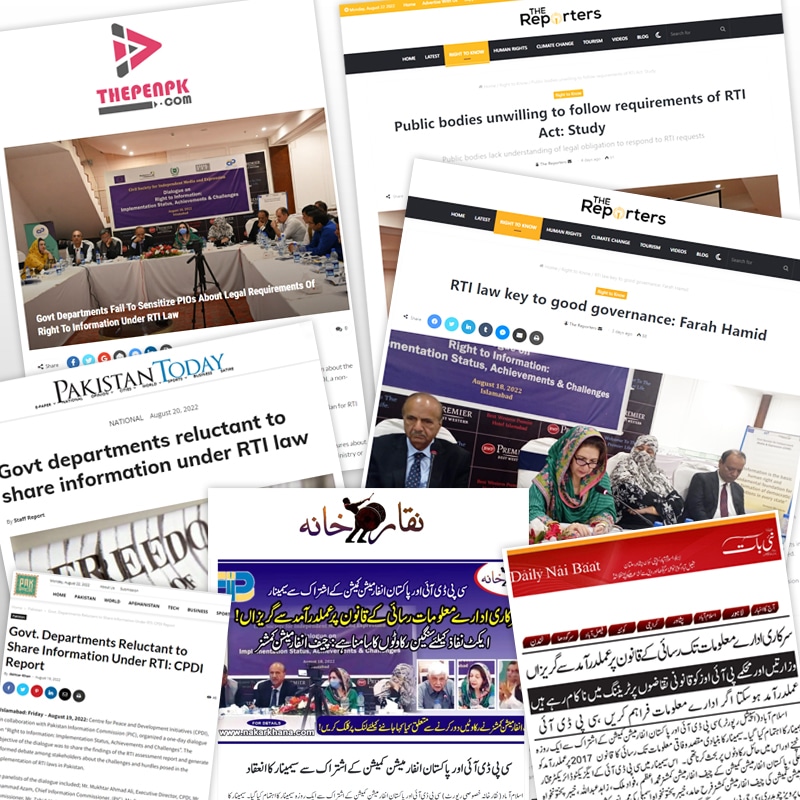
RTI Dialogue held on 18 August 2022
CPDI in collaboration with Pakistan Information Comission organized Dialogue on “Right to Information: Implementation Status, Achievement, and Challenges”. The objective of the dialogue was to assess the status of access to information at the Federal level in Pakistan and identify challenges that need to be addressed by civil society and public bodies. A report on “Assessment of Right to Information Implementation (Proactive & Reactive Disclosure)” was also launched during the dialogue. The event was covered by various media outlets.
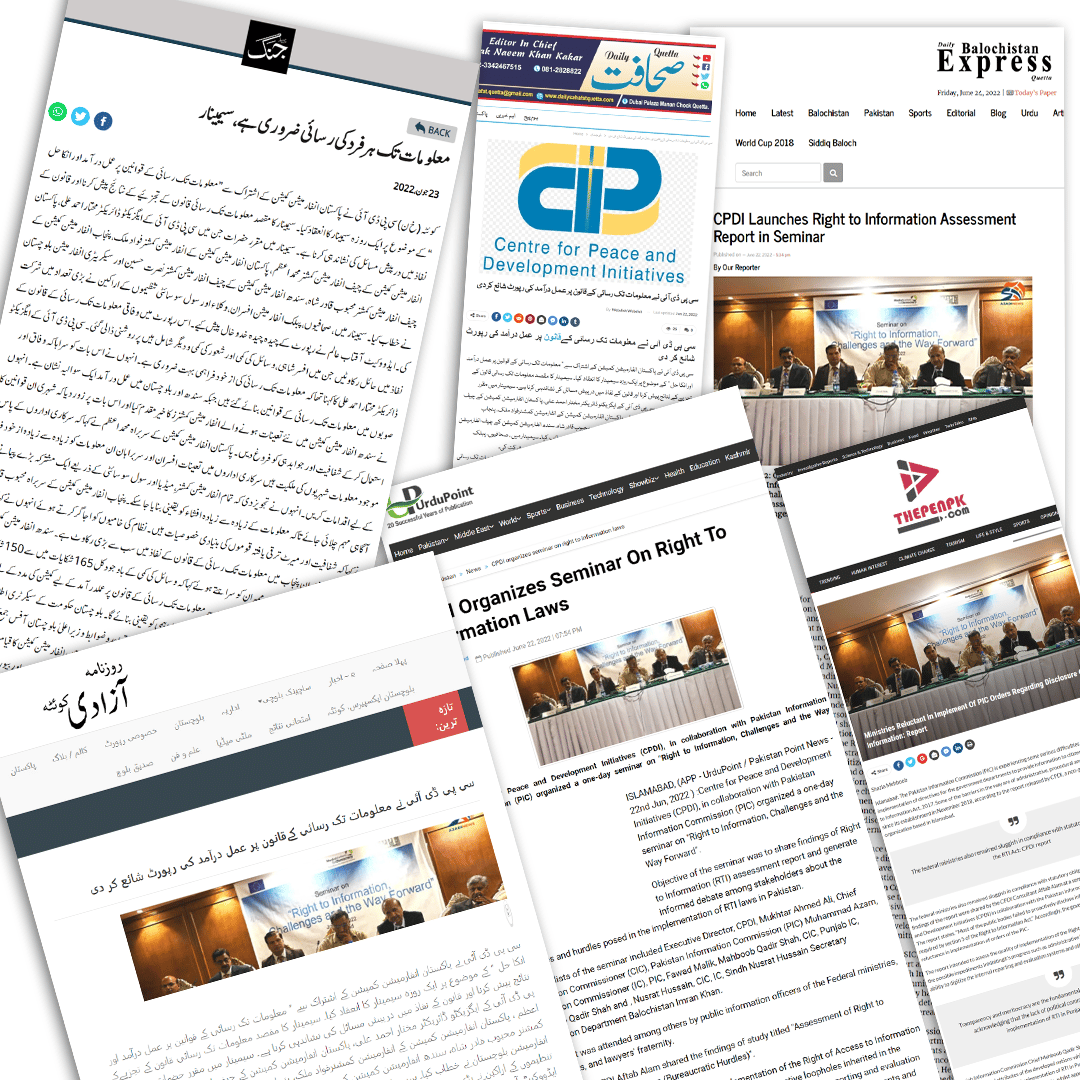
RTI Seminar held on 21 June 2022
CPDI in collaboration with Pakistan Information Comission organized a seminar on RTI. The objective of the Seminar was to assess RTI implementation in Pakistan, & identify challenges that need to be addressed. Proceedings of the event were published in leading newspapers.
CPDI Launches Right to Information Assessment Report in Seminar – June 22, 2022
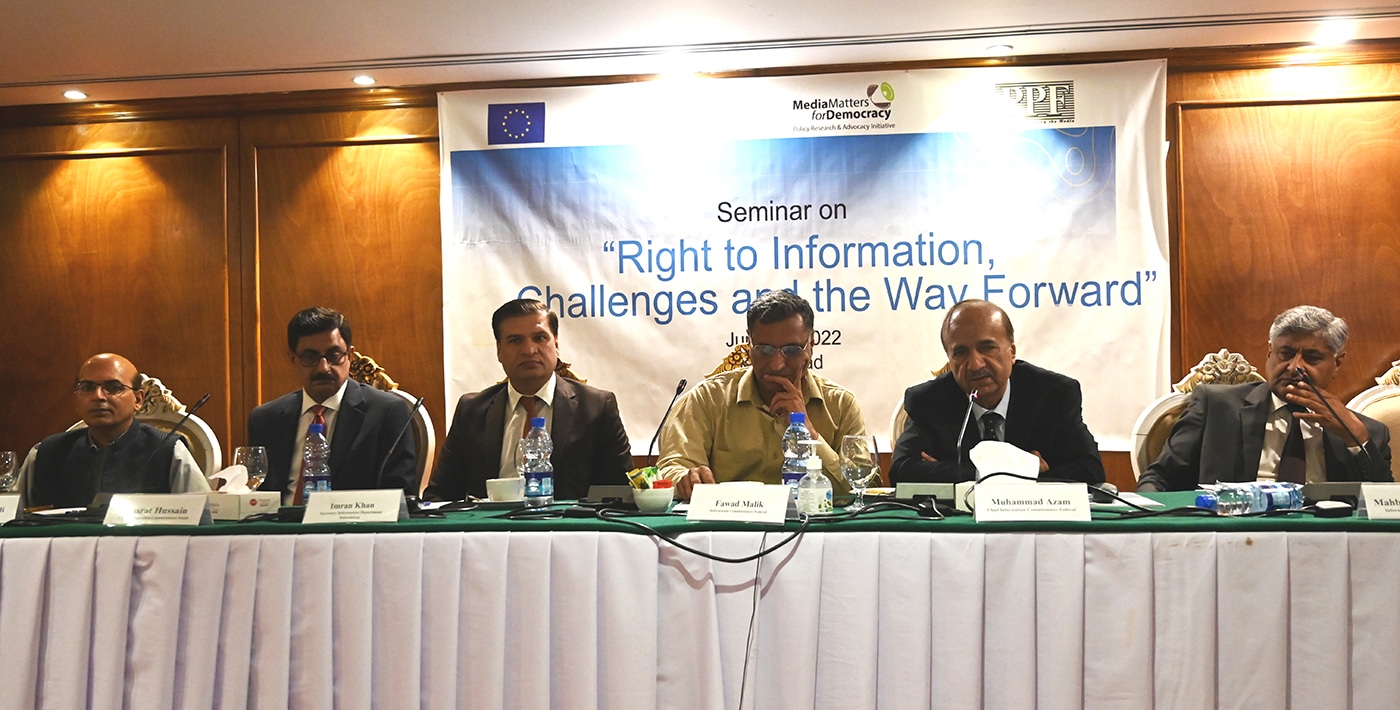
Press Release
CPDI Launches Right to Information Assessment Report in Seminar
Islamabad: Tuesday – June 22, 20022: Centre for Peace and Development Initiatives (CPDI), in collaboration with Pakistan Information Commission (PIC) organized a one-day seminar on “Right to Information, Challenges and the Way Forward”. Objective of the seminar is to share findings of RTI assessment report and generate informed debate among stakeholders about the challenges and hurdles posed in the implementation of RTI laws in Pakistan.
The panelists of the conference included; Mukhtar Ahmad Ali, ED CPDI, Muhammad Azam, Chief of Pakistan Information Commission (PIC), Mahboob Qadir Shah, Chief of Punjab Information Commission, Nusrat Hussain Chief of Sindh Information Commission and Imran Khan, Secretary Information Department Balochistan. The event was attended by Public Information Officers (PIOs) of the Federal Ministries, journalists, CSOs’, media and lawyers.
Aftab Alam, Consultant, CPDI shared the findings of study titled “Assessment of Right to Information Implementation (Bureaucratic Hurdles)”. The Study aims to assess the quality of implementation of the RAI Act, 2017; including major impediments i.e administrative loopholes inherited in the system, lack of required resources and ability to digitize the internal reporting and evaluation systems that make PIOs answerable to the head of departments and other bureaucratic hurdles. The study highlights that Pakistan Information Commission is facing serious challenges to implement the Act. These challenges includes administrative, procedural and legal, since its establishment in November 2018. Moreover, Federal ministries remained sluggish in compliance of statutory obligations under the Act. Most of the public bodies failed to proactively disclose information on their websites as required by section 05 of the RAI Act. Government authorities also showed reluctance in implementation of orders of the PIC.
Mukhtar Ahmad, ED CPDI, said that essence of RTI revolves around online/offline proactive disclosure of information by government departments. He appreciated that RTI laws have been enacted in Provinces and Federal level whereas implementation still remains questionable especially in Sindh and Balochistan. He welcomed the newly appointed information Commissioners in Sindh Information Commission (SIC). He encouraged citizens to use their fundamental right to know to promote transparency and public accountability and inclusiveness of citizens. Mehboob Qadir Shah, Chief of Punjab Information Commission remarked that transparency and meritocracy are the fundamental attributes of developed nations. While highlighting the flaws in system, he said that lack of political commitment is main hurdle in implementation of RTI in Punjab.
Nusrat Hussain, Chief Information Commissioner (SIC) while appreciating his predecessors said that despite of lack of administrative support and resources, 150 complaints were resolved out of the total 165 complaints by SIC. He remarked that, provincial government of Sindh is committed to strengthen SIC for effective implementation of RTI. He added, in the last week, they have received 30 information requests from citizens. Newly Appointed Chief of SIC is determined to improve website of SIC to ensure proactive disclosure of information whereas lack of resources and staff are the main challenges for SIC.
Muhammad Azam, Chief of Pakistan Information Commission remarked that citizens are the custodian of information held by government departments. He commented about the bureaucratic behaviors of government departments and PIOs regarding maximum disclosure of information and public record. A joint massive awareness campaign shall be run by commissions, media and civil society to ensure maximum disclosure of information, he suggested.
Imran Khan, Secretary Information, Government of Balochistan said Rules under Balochistan RTI Act, 2021 are laid before the Chief Minister Balochistan and will be finalized soon. Establishment of Balochistan Information Commission will be established by December 2022, he added. He reiterated that culture of secrecy, lack of political will, lack of awareness in citizens and bureaucratic hurdles are the challenges in the path of RTI implementation in Balochistan. During the question answer session, the participants were enlightened in detail regarding implementation of RTI laws in Pakistan. At the end, all the participants pledged to continue their joint efforts for the promotion of transparent and accountable RTI regime in Pakistan.
About CPDI: Centre for Peace and Development Initiatives (CPDI) is an independent, non-partisan and a not-for-profit registered civil society organization working on the issues of Development and Peace in Pakistan. The Seminar was held under the Project funded by the European Union titled Civil Society for Independent Media and Expression (CIME).
Contact: Syed Raza Ali
Project Coordinator – CPDI- Cell: 0333-8827341
raza@cpdi-pakistan.org
Press Release: Federal Budget Bulletin 2022-23 issued
PRESS RELEASE
Federal Budget Bulletin 2022-23 Issued
June 15, 2022 Islamabad: Centre for Peace and Development Initiatives (CPDI) has issued a bulletin on Federal Budget 2022-23. The bulletin compares the budget figures for the previous five years with the targets for upcoming FY 2022-23. It also reveals that while drafting the budget, the government has faced numerous economic challenges characterised by an aggravated increase in fuel prices, delays in negotiations with IMF for budgetary support, free fall of rupee in the recent weeks and the subsequent rising cost of living.
According to bulletin coalition govt announced PKR 7004 bn FBR Tax revenue target for 2022-23, which is 16.7% above from the revised targets of 2021-22, whereas Finance Minister also indicated the leakage of PKR 3000 bn in FBR but did not announce measures to prevent it. The indirect tax to direct tax ratio (1.7.) for 2022-23 signifies that there is no tax reform to increase the horizontal base for direct tax. This also nullifies the Finance Minister’s claim that they are protecting the poor and taxing the rich. The 52% increase in non-Tax revenue signifies that the government has decided to collect a levy on POL products and sooner or later people must bear this burden. The government next year is eyeing collecting PKR 750bn petroleum levy, PKR 8 bn from the petroleum levy on LPG. In non-tax revenue, the Government is also hoping for PKR 200 bn from Gas Infrastructure Development Cess. Such various taxes will bring a storm of inflation in the country which will make it difficult for the common man to survive.
Bulleting highlighted that Pakistan requires PKR 6582 bn for debt servicing and repayment for the next financial year. The finance minister believes an IMF deal will help secure agreements with other multilateral financial institutions like World Bank and friendly nations, including China. The government claims that ‘on the external front, various policy actions were undertaken including bilateral and multilateral arrangements, IMF program continuity and exchange rate stability”, but it has set a zero target for Budgetary support from IMF during 2022-23. The target of PKR 3115 bn external receipts will be achieved through loans from Islamic Development Bank, Euro Bonds, Saudi Arabian oil facility, commercial banks, and project grants for PSDP. Most of these loans are subjected to a green signal from IMF. This also shows where the government is currently standing in its negotiations with the IMF.
According to bulletin, a significant part of the current expenditure on the revenue account will go into debt servicing. The 76% (PKR 3950 of the PKR 5197 bn allocated to the Functional head of ‘General Public Services’ will go to debt servicing. This includes PKR 510 bn for foreign debt servicing and PKR 3439 bn for domestic debt servicing. The other significant cost from this functional head is civil and military pension. The total pension expenditure of the federal government is PKR 530 bn.
The budget allocated against ‘Defence Affairs and Services’ is PKR 1526 bn, out of which PKR 1523 bn will go to the Defence Services. This defence services expenditure is 17.6% of the total current budget on Revenue Account. This allocation is 11.1% higher than the Budget Estimates of 2021-22 and 2.9% of the Revised Estimates of 2021-22.
The study reveals that Development Expenditure on Revenue account is PKR 453 bn, which is 24% less than the Budget Estimates for 2021-22. This shows that fiscal space is shirking rapidly, and the federal government has fewer resources to allocate to development. The decreasing ratio means that government has less fiscal space to allocate budget for development expenditure.
As per the study since 2013-14, Pakistan’s Total Public Debt has been more than 60% of the GDP. This is against Principles of Sound Fiscal and Debt management as enshrined in Section 3 of the Fiscal Responsibility and Debt Limitation Act, 2005 (amended 2016), which states that Section 3(b): beginning from the financial year 2016-17, the total public debt shall be reduced to sixty per cent of the estimated gross domestic product.
The bulletin indicated that the budget estimates are based on one central supposition that negotiations with IMF will be successful, and Pakistan will receive budgetary support for the next year. The government has claimed that it has fulfilled or is fulfilling all the necessary conditions of IMF, including the increase in POL prices and utility charges.
About CPDI: Centre for Peace and Development Initiatives (CPDI) is an independent, non-partisan and a not-for-profit registered civil society organization working on the issues of Development, Peace and access to information in Pakistan.
For more information, please contact
Faisal Manzoor | Project Manager
Centre for Peace and Development Initiatives (CPDI), Islamabad
Contact: 0336-5444144
Email: faisalm@cpdi-pakistan.org
Tel: +92 51 831 27 94, 831 27 95 | Fax: +92 51 8443633
Press Release: CPDI conducted One-day orientation session for the newly elected representatives on the new local government system in KP
Peshawar, June 1, 2022: Centre for Peace and Development Initiative and GIZ Pakistan in collaboration with Local Government Election and Rural Development Department (LGE&RDD) Khyber Pakhtunkhwa, organized one-day orientation session for the newly elected Mayors and Tehsil Chairmen of Local Government Khyber Pukhtunkhwa. CPDI conducted the orientation session in two batches. In both the batches more than 50 elected representatives participated.
 Mr. Zaheer Ul Islam Secretary Local Government Election and Rural Development Department, Government of Khyber Pakhtunkhwa, inaugurated the session and congratulated newly elected Local Government representatives. He shed light on importance of the capacity building of tehsil chairmen and explained their role and responsibilities in Municipal Services Improvement as prescribed in Local Government (LG) Act. He urged the need for enhancing citizen’s participation in Municipal Services Development Programme. He further added that LG representatives have been a breeding ground for Provincial and Federal level political leadership.
Mr. Zaheer Ul Islam Secretary Local Government Election and Rural Development Department, Government of Khyber Pakhtunkhwa, inaugurated the session and congratulated newly elected Local Government representatives. He shed light on importance of the capacity building of tehsil chairmen and explained their role and responsibilities in Municipal Services Improvement as prescribed in Local Government (LG) Act. He urged the need for enhancing citizen’s participation in Municipal Services Development Programme. He further added that LG representatives have been a breeding ground for Provincial and Federal level political leadership.
Mr. Hifz ur Rehman Formal Secretary LGE&RD Government of KP explained about the devolution of powers and evolution of LG systems; composition, functions and responsibilities of Local Governments; bye-laws and regulations; financial functions of Local Governments; and Tehsil Development Plan & VC/NC Development Plan. Session was concluded with vote of thanks from Mr. Barkat Ullah Khan Durrani, Director-Local Governance School, LGE&RD Department, Government of Khyber Pakhtunkhwa. The session ended with distribution of certificates of participation to the participants.
About CPDI: Centre for Peace and Development Initiatives (CPDI) is an independent, non-partisan and a not-for-profit registered civil society organization working on the issues of Development, Peace and access to information in Pakistan.
Contact Person:
Noor Alam | Provincial Coordinator
Centre for Peace and Development Initiatives (CPDI)
Tel: +92 51 831 27 94, 831 27 95 | Fax: +92 51 8443633
Cell: 0345-4435179
Email: noor@cpdi-pakistan.org
Press Release: CPDI conducted One-day orientation session for the newly elected representatives on the new local government system in KP
Peshawar, June 1, 2022: Centre for Peace and Development Initiative and GIZ Pakistan in collaboration with Local Government Election and Rural Development Department (LGE&RDD) Khyber Pakhtunkhwa, organized one-day orientation session for the newly elected Mayors and Tehsil Chairmen of Local Government Khyber Pukhtunkhwa. CPDI conducted the orientation session in two batches. In both the batches more than 50 elected representatives participated.
 Mr. Zaheer Ul Islam Secretary Local Government Election and Rural Development Department, Government of Khyber Pakhtunkhwa, inaugurated the session and congratulated newly elected Local Government representatives. He shed light on importance of the capacity building of tehsil chairmen and explained their role and responsibilities in Municipal Services Improvement as prescribed in Local Government (LG) Act. He urged the need for enhancing citizen’s participation in Municipal Services Development Programme. He further added that LG representatives have been a breeding ground for Provincial and Federal level political leadership.
Mr. Zaheer Ul Islam Secretary Local Government Election and Rural Development Department, Government of Khyber Pakhtunkhwa, inaugurated the session and congratulated newly elected Local Government representatives. He shed light on importance of the capacity building of tehsil chairmen and explained their role and responsibilities in Municipal Services Improvement as prescribed in Local Government (LG) Act. He urged the need for enhancing citizen’s participation in Municipal Services Development Programme. He further added that LG representatives have been a breeding ground for Provincial and Federal level political leadership.
Mr. Hifz ur Rehman Formal Secretary LGE&RD Government of KP explained about the devolution of powers and evolution of LG systems; composition, functions and responsibilities of Local Governments; bye-laws and regulations; financial functions of Local Governments; and Tehsil Development Plan & VC/NC Development Plan. Session was concluded with vote of thanks from Mr. Barkat Ullah Khan Durrani, Director-Local Governance School, LGE&RD Department, Government of Khyber Pakhtunkhwa. The session ended with distribution of certificates of participation to the participants.
About CPDI: Centre for Peace and Development Initiatives (CPDI) is an independent, non-partisan and a not-for-profit registered civil society organization working on the issues of Development, Peace and access to information in Pakistan.
Contact Person:
Noor Alam | Provincial Coordinator
Centre for Peace and Development Initiatives (CPDI)
Tel: +92 51 831 27 94, 831 27 95 | Fax: +92 51 8443633
Cell: 0345-4435179
Email: noor@cpdi-pakistan.org
Punjab’s teacher challenge
Pursuit of education is impossible if there are no teachers available to make it a possibility for our deprived children. The supply-side barriers to education that we see in Punjab demands effective oversight by citizens.
Recent data on teachers acquired by the CPDI – a citizen-led initiative headed by Mukhtar Ali – under the Punjab Transparency and Information Act, 2013 has revealed a disturbing fact: there are over 81,466 seats lying vacant against 433,134 sanctioned posts, amounting to an overall teacher shortfall by 19 percent in the province.
A closer look into these numbers shows a far grimmer picture of teacher-supply disparities within districts. About 55 percent of the districts (20 out of 36 districts) have over 20 percent vacant seats, while for the rest of the districts, the vacant seats lie at 15 percent or above (with the exceptions of Jhang and Sialkot both of which have over at 13 percent of the vacant seats). Sialkot has the lowest share of 13 percent teacher shortfall whereas Jhelum, shockingly, has the highest at 39 percent (out of 4,034 seats, 1,591 are lying vacant).
If the numbers mentioned in the stamped copies provided by the education officer in Jhelum are to be believed, then the district is embroiled with serious teacher shortfall issues. The information received reveals 1,098 sanctioned posts against which 1030 seats are empty. That makes a 94 percent teacher shortfall for primary level schools alone. Other indicators point towards an 80 percent subject specialist shortfall for 182 secondary and 12 higher secondary schools in the district.
In Faisalabad, 52.3 percent of the sanctioned seats lying vacant for subject sspecialists for secondary (533) and higher secondary schools (63) have. For the headmasters, 59.12 percent of seats are lying vacant.
In Gujarat also, 71 percent of posts for headmasters/headmistresses are vacant. Serious shortages of subject specialists are also seen, with 84 percent of the sanctioned seats lying vacant for 317 secondary and 162 higher secondary schools in the district.
Each district presents a story of the dire situation of teachers there. With no teachers available, how schools manage students is no major mystery here. Students drop out when they find no learning at schools. Economically burdened parents will no longer feel persuaded to keep their children at school if their time is not meaningfully spent there.
A trend analysis of teacher recruitments as available in the School Education Census report 2020/21 shows a dismal performance in primary and elementary levels of school. The highest number of recruitments were observed between 2016 and 2018, with an increase by 29.5 percent in teacher recruitments for primary. However, the upward trend was not maintained, and a declining trend is strikingly noticeable with a drop of numbers by 11 percent between 2018 and 2020.
The most worrying observation is the drop in elementary teacher strength by 19.4 percent in a single year in 2020. The highest number of recruitments were observed in 2017; however, between 2018 and 2020, the drop in the strength is estimated at 23 percent.
The school education department’s website shows that over 5,000 teachers are expected to retire from service in 2022 and another 6,300 teachers will retire in 2023. That makes about another 11,300 teachers vacating their seats very soon. Add to the list the ‘erratic postings’ of the teachers, which are 4,421 in total [this means they will be transferred to other districts as they leave behind a void in the schools they are currently posted at]. With almost nil new recruitments between 2018 and 2020, and the increasing trend in teacher shortfall, where are we really headed?
There is much to lament about the poor education service delivery on the part of the provincial government. The reluctance of district education officials towards sharing education-related information seriously undermines the significance of RTI laws. The serious disparities observable within the districts call for more probes into the causes of low recruitments against the mammoth challenge of education deprivation for millions of children. The stalling of recruitment processes during a government’s tenure and then filling the vacancies right before elections for political mileage have been a most damaging practice by our politicians, as it has caused serious losses to our students and schools. As has been observed in previous government tenures as well, was the PTI-led government in Punjab intending to do the same?
The change in guard in Punjab will come with its own set of challenges and political point-scoring amidst a crisis. With the election for the new chief minister made controversial by the governor of Punjab, the delays and prolonging of the new cabinet as a result will add on to the provincial challenges. Perhaps with Hamza Shehbaz as CM-elect and Rana Mashud as the minister for education, replacing the PTI’s Murad Raas, the two will not repeat old mistakes once they come into power.
The current policies regarding teacher recruitment need to be reassessed for their feasibility. Teachers have long been complaining of not just the abysmally low basic pay, but also the non-revision of the rent and conveyance allowances. Teaching is no longer an appealing profession, as people have started looking for other industries that can promise them more protection and reasonable incomes. If such discouraging conditions for teachers remain unchanged, how can we expect the Punjab government to generate and attract new recruits at a time of an education crisis in Punjab? Those already in service are suffering because they don’t really know how to make ends meet and survive the rising inflation. Eventually, nobody will be left to teach our students, who too will feel compelled to drop out.
With over 19 percent of vacant seats in the province, one feels compelled to ask as to where the unutilized salaries against these posts have been directed to? This is an important question, keeping in mind the claim of 80-90 percent of the education budget in the province getting consumed by non-development expenditures (teacher salaries) of education – a claim that now needs more accountability efforts on the part of the Punjab government as there has been a persistent decrease in teacher strength since 2018.
Furthermore, it remains to be seen how the new incoming education ministry – for whatever time frame – will be able to address the structural fault that lies at the heart of not matching up the new initiatives with teachers’ existing capacities? What future is in store for education in the province? One shudders at the thought.
The writer is an education research consultant based in Lahore. She can be reached at: zeeba.hashmi@gmail.com

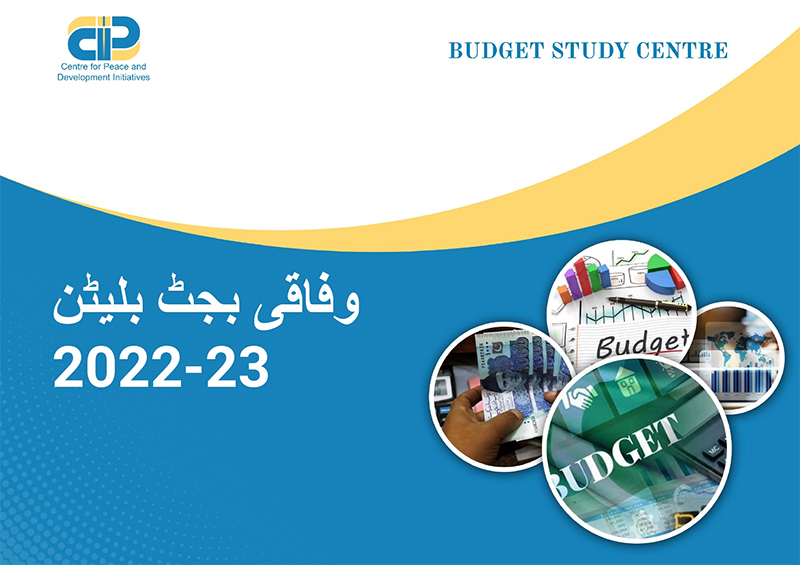
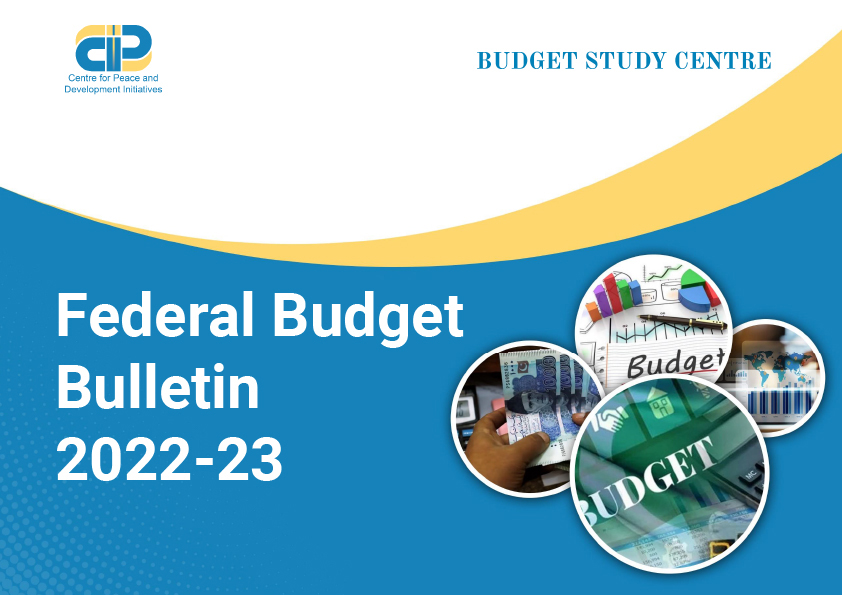







 Users Today : 1548
Users Today : 1548 Users Yesterday : 1375
Users Yesterday : 1375 This Month : 41637
This Month : 41637 This Year : 230065
This Year : 230065 Who's Online : 87
Who's Online : 87